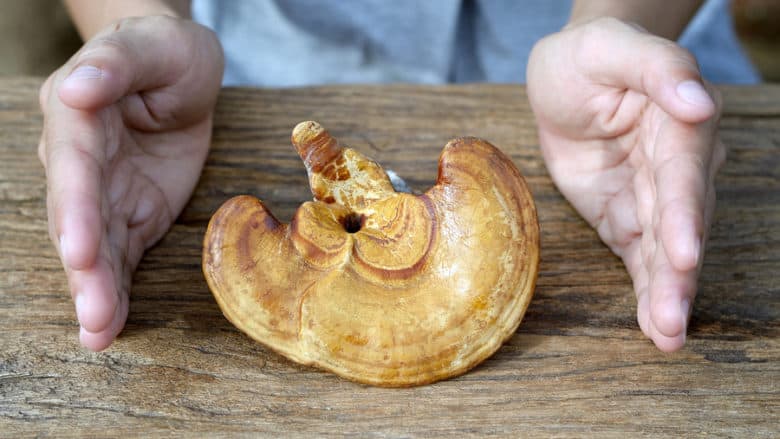
Reishi mushroom, revered as a semi-magical herb in China and Japan, counts as one of the most important tonic mushrooms due to its reputation for promoting vitality, longevity, and wellness. (For more on herbal tonics see the ginseng article).
Contemporary herbalists regard reishi (Ganoderma lucidum) as an adaptogen, a substance that helps the body resist stress of all kinds. It’s often combined with “cousin” fungi, such as shiitake, maitake, hoelen, or polyporus.
Unlike ginger and garlic, its bitter taste and tough, woody texture make it a purely medicinal herb. It’s rarely used in culinary ways, although I just received a sample packet of Madre Labs called “CaféCeps.” This instant organic coffee blend includes Codyceps & Reishi!
If you don’t mind its bitter taste, grind up the mushroom and make a tea or try it in a coffee blend. Reishi mushroom also comes in tablet or capsule form (just follow the label directions).
What Reishi Studies Say
One of the most researched mushrooms; reishi studies indicate it may have these medicinal uses:
- Improves immune function
- Inhibits growth of malignant tumors
- Anti-inflammatory effects
- Reduces allergic responsiveness
- Protects the liver(as does milk thistle)
- Enhances mental function
- Helps viral infections including herpes and shingles
- Helps autoimmune diseases like multiple sclerosis and myasthenia gravis
- May help other conditions: high blood pressure, diabetes, altitude sickness, ulcers, insomnia
Noting a number of these studies, Andrew Weil, MD, director of Integrative Medicine at the University of Arizona, recommends using reishi mushroom as a regular herbal tonic.
Whereas, ConsumerLab.com cautions that more quality studies are needed to confirm these medicinal benefits, “However, while there has been a great deal of basic scientific research into the chemical constituents of reishi, reliable double-blind, placebo-controlled studies are all but nonexistent.”
Safety and Special Precautions
Reishi mushroom is nontoxic and safe for most people when taken appropriately. However, as with any substance, some may be sensitive or allergic to reishi.
Because a few studies found that reishi might impair blood clotting and lower blood pressure, take it under a doctor’s supervision in these instances:
- You have bleeding problems
- Before, during or after surgery
- When taking drugs that interfere with clotting (aspirin, warfarin, heparin, Plavix and others
- If you have low blood pressure or are on drugs that lower blood pressure
Reishi’s safety in young children, pregnant or nursing women, or those with severe liver or kidney disease has not been established.
Key Points
Reishi enjoys an excellent reputation, as does green tea in Chinese and Japanese traditional medicine as a support to natural healing. It’s attracting interest in US medicine too, although some advocate for more study of its medicinal benefits.
It’s nontoxic and safe except for the instances noted above. Like most tonics, you must take reishi on a regular basis to achieve its overall health benefits. If you decide to try it, take daily for at least 2 months and see what reishi mushroom can do for you!
Sources and Resources
ConsumerLab.com at http://www.consumerlab.com.
Reid, Daniel, The Complete Book of Chinese Health & Healing (Boston: Shambhala, 1995).
Weil, Andrew, 8 Weeks to Optimal Health (New York: Ballantine Books, 2007).
